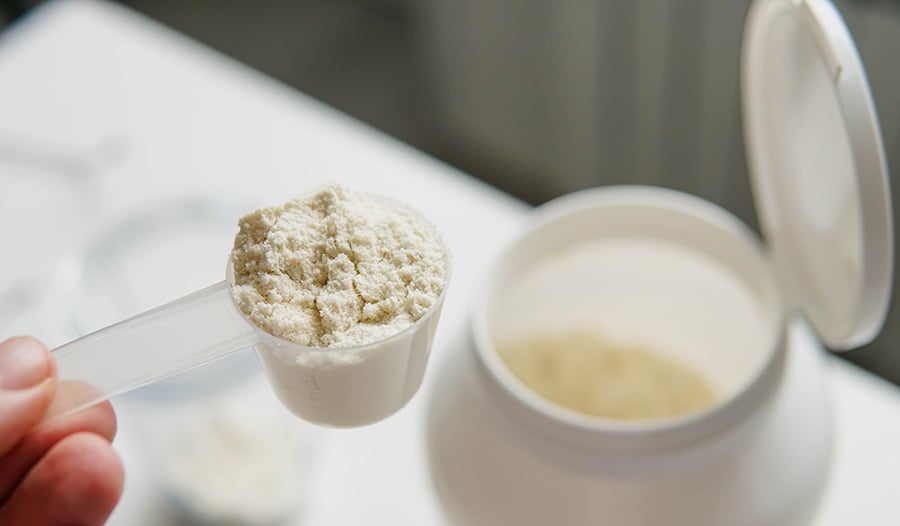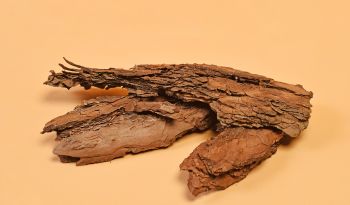Låsa upp kreatins kraft: 5 sätt män kan maximera resultaten

Oavsett om du just har hört talas om kreatin eller om du redan använder det regelbundet, utforskar den här guiden hur man maximerar kreatinets potential för män inom fyra områden, inklusive att bygga muskler, förbättra återhämtningen, behålla muskelmassa med åldern, stödja hjärnhälsa och förbättra mentalt fokus med beprövade sätt att hjälpa dig att optimera dess effekter.
Vad är kreatin så viktigt?
Kreatin är en naturligt förekommande förening som finns i små mängder i livsmedel som rött kött och fisk, och din kropp kan också skapa det från vissa aminosyror. 1 Med rätt näring tillverkar din kropp cirka 2 gram kreatin om dagen och lagrar det i muskelcellerna, där det hjälper din kropp att producera adenosintrifosfat (ATP), som är en viktig energikälla som används när du tränar hårt.} 2
Årtionden av användning av idrottare och forskning har visat att när du ökar nivån av kreatin som lagras i musklerna genom tillskott, stöder det att bygga muskler, återhämta sig och behålla muskelmassa, och på senare tid har det identifierats fördelar med att stödja hjärnhälsa och mentalt fokus.3
Vad är den bästa typen av kreatin?
Svaret är klart. Kreatinmonohydrat är det bästa alternativet av många skäl.
För det första är det den mest undersökta formen av kreatin, med tusentals studier under årtionden för att stödja det som den mest pålitliga formen.4 För det andra absorberas kreatinmonohydrat mycket av kroppen vid 99%, så det finns ingen signifikant fördel med alternativ.5 För det tredje har kreatinmonohydrat den mest beprövade säkerhetsprofilen, efter att ha studerats bland ett brett spektrum av friska män och kvinnor, från idrottare till idrottare äldre vuxna, i både kort- och långtidsstudier med 3 till 5 gram/dag.6 Långtidsstudierna stödjer också kreatinets säkerhet utan att skada friska individer.7 Och slutligen är kreatinmonohydrat mycket kostnadseffektivt, vilket gör det lättare att lägga till i din dagliga rutin till ett överkomligt pris.
Hur man ökar kreatinets fördelar
1. Bygga muskler
Kreatin är ett utmärkt tillskott för muskeltillväxt, med stöd av omfattande forskning med både yngre och äldre vuxna.8
Så här optimerar du det:
- Inkludera regelbunden motståndsträning: Kreatin ökar energin för mer intensiva träningspass, vilket möjliggör tyngre lyft eller fler reps, vilket ökar muskeltillväxten. Ett strukturerat motståndsträningsprogram med fria vikter eller motståndsmaskiner 3-4 gånger i veckan förbättrar denna effekt. Progressiv överbelastning, vilket innebär gradvis ökande vikt eller intensitet, hjälper också till att öka den totala tillväxten.9
- Håll dig konsekvent vid daglig användning och dosering: Konsistens är viktigt med kreatin, även på vilodagar. Att ta 5 gram kreatin varje dag säkerställer att muskelceller förblir mättade med kreatin, vilket upprätthåller fördelar. För män som precis börjat med kreatin konsekvent, överväga att få dina muskler till en högre nivå med en laddningsfas för kreatin. En laddningsfas varar i 7 dagar och innebär att man tar 20 gram/dag i fyra doser på 5 gram. Denna fas laddar musklerna snabbt, mättar musklerna och bör sedan följas av 5 gram dagligen. Alternativt uppnår en stadig 5 gram dagligen liknande resultat under några veckor.10 Genom att integrera kreatin med träning, näring och kompletterande kosttillskott kan män avsevärt förbättra muskelbyggande resultat.
- Att hålla sig hydratiserad är nyckeln: Kreatin ökar vätskeretentionen i musklerna, främjar ett hydratiserat tillstånd som hjälper till att återhämta sig. Män bör sikta på 8-10 koppar vatten dagligen, justera efter aktivitetsnivå, för att förhindra uttorkning och maximera denna effekt.14
2. Förbättra återhämtningen
Kreatin påskyndar återhämtningen efter intensiv träning, vilket gör det till ett värdefullt verktyg för aktiva män. Studier visar att kreatin sänker markörer för muskelskador och inflammation efter träning, minskar ömhet och påskyndar återhämtningen.
Så här optimerar du det:
- Timing efter träning med protein: Att kombinera kreatin med 20-30 gram vassleprotein efter träning har en synergistisk effekt för att förbättra muskelproteinsyntesen. Studier visar att en kombination av de två kan leda till större muskelvinster än enbart kreatin.12 Vassleprotein ökar direkt muskelproteinsyntesen, vilket hjälper till att bygga bättre muskelmassa och styrkeökningar. Denna kombination skapar en anabol miljö, vilket är särskilt viktigt direkt efter träning för att bygga upp och växa muskler efter att den har brutits ner av träning.
- Överväg att lägga till kolhydrater efter träning: Detta är särskilt viktigt efter intensiva träningspass, eftersom du måste ersätta förlorade glykogenlager (den viktigaste bränslekällan för högintensiv träning). Att ta kreatin omedelbart efter träningen med kolhydrater (förutom protein) påskyndar glykogenersättningen, vilket påskyndar återhämtningstiden.13 Det finns många sätt att lägga till snabbverkande kolhydrater, till exempel att lägga till en banan eller frukt/fruktjuice till din shake efter träningen.
- Vila och sömn: Kreatinets återhämtningsfördelar förstärks med tillräcklig sömn (7-9 timmar per natt) och vilodagar. Sömn stöder muskelreparation, medan vila försvarar sig mot effekterna av överträning, vilket säkerställer att kreatinets fulla potential realiseras.15
3. Behålla muskelmassa för äldre män
Tyvärr kan muskelmassförlust börja så tidigt som 30, börja mycket gradvis och bli mer märkbar i 40- och 50-talet.16 Vid 50 år förlorar män i genomsnitt 10-15% av sin muskelmassa, vilket accelererar i 60-talet, men kreatin kan hjälpa.17
Så här optimerar du det:
- Styrketräning är viktigt: Kreatin ökar styrka och muskelmassa hos äldre vuxna när det kombineras med motståndsträning. Att träna minst 3 gånger i veckan med motståndsövningar kan avsevärt motverka sarkopeni.18
- Öka proteinintaget: Förutom kreatin kräver muskler mer protein när du åldras till 50-talet och därutöver - 0,5 till 0,7 gram per kilo kroppsvikt för en 170 lb man. Att kombinera kreatin med protein är en vinnande kombination för muskelunderhåll.19
- Konsistens spelar roll: Det är viktigt att upprepa att intag av kreatin varje dag, även på icke-träningsdagar, upprätthåller muskelkreatinnivåerna och stödjer långvarig muskelretention. Behandla det som din multivitamin för muskler!20
4. Stödja hjärnhälsa och mentalt fokus
Ny forskning belyser kreatinets potential för hjärnhälsa, särskilt hos män. Hjärnan är beroende av ATP, och kreatin kan öka dess tillförsel, vilket potentiellt skyddar mot neurodegenerativa sjukdomar.21 Detta är lovande för långsiktig kognitiv hälsa, även om fler studier behövs. Kreatin förbättrar korttidsminnet och resonemanget, särskilt hos dem med låg dietkreatin.22 Forskning tyder också på att kreatin minskar mental utmattning, vilket möjliggör mer långvarig koncentration.23
Så här optimerar du det:
- Dagligt tillskott: En konsekvent 3-5 gram daglig dos säkerställer en stadig tillförsel till hjärnan, eftersom kognitiva fördelar ackumuleras över tiden. Att blanda kreatin i kaffe eller en morgonshake kan göra denna rutin sömlös.
- Följ en hälsosam livsstil: Tillräcklig sömn, hydrering och stressreducering (t.ex. meditation) förbättrar kreatinets fokusökande effekter. Koppla ihop kreatin med hjärnförstärkande vanor som regelbunden träning och mental stimulering.
- Strategisk timing: Att ta kreatin 30-60 minuter före mentalt intensiva uppgifter kan öka fokus. Blanda till exempel 3-5 gram i en frukostsmoothie eller vatten före arbetet före ett möte eller tentamen.
- Kombinera med koffein: En studie från 2024 undersökte effekterna av kreatin och koffein taget tillsammans i 7 dagar av män som regelbundet tränade. Den fann betydande förbättringar i kognitiv funktion, vilket indikerar att kombinationen erbjuder fler fördelar än endera ensam.24
5. Öka energi- och träningsprestanda
Kreatinmonohydrat är en högenergiförening som återvinner och bygger ATP (adenosintrifosfat) lagrar i dina muskler, vilket är ”cellens energivaluta” med förmågan att öka träningskapaciteten.25 Kreatinmonohydrat förbättrar energiproduktionen, vilket möjliggör större effekt och ökade anaeroba trösklar och arbetsförmåga under intensiva övningar som basket, cykling, tennis, sprint, simning, tyngdlyftning och många andra sporter aktiviteter.26
Så här optimerar du det:
- Tidsanvändning av kreatin före träning för att öka prestandan: Att ta kreatin 30-60 minuter före en högintensiv sport, träning eller tyngdlyftning är det optimala intervallet för att stödja energiproduktion, arbetsförmåga och prestanda.27
- Lägg till kolhydrater: Generera mer energi att använda under högintensiv träning. Tillsats av 20-35 gram kolhydrater ökar nivån av kreatintransport, vilket gör att mer kreatin både kan frigöras och lagras i musklerna.28 Detta ger högre nivåer av ATP-generering i muskeln än att ta kreatin ensam, vilket kan hjälpa till att optimera dess effektivitet.29
- Kombinera kreatin med koffein: Denna kombination är fördelaktig före högintensiva lagsporter, cykling eller tyngdlyftning. Kreatin och koffein är fördelaktiga för sport och övningar som involverar intensiva energiutbrott, samt stöder uthållighetsnivåer och fokus genom kombinationen av högre ATP-frisättning och uthållighet och fokusfördelar med koffein.30
Avhämtning
Kreatin är inte bara ett av de mest undersökta kosttillskott, men det är också ett av de mest mångsidiga. Att införliva dessa optimeringstips i din rutin är ett sätt att få ut ännu mer av det. Sammantaget är konsekvent användning nyckeln till att upprätthålla kreatinnivåer och justera vad du kombinerar kreatin med och timing, beroende på ditt mål.
Referenser:
- Wyss M, Kaddurah-Daouk R. Kreatin och kreatininmetabolism. Fysiologiska recensioner. 2000; 80 (3): 1107-1213.
- Hultman E, Söderlund K, Timmons JA, m.fl. Muskelkreatinbelastning hos män. Tidskrift för tillämpad fysiologi. 1996; 81 (1): 232-237.
- Kreider RB, Kalman DS, Antonio J, m.fl. International Society of Sports Nutrition ställningsställning: säkerhet och effekt av kreatintillskott i träning, sport och medicin. Tidskrift för International Society of Sports Nutrition. 2017; 14:18.
- Buford TW, Kreider RB, Stout JR, m.fl. International Society of Sports Nutrition ställningsställning: kreatintillskott och träning. Tidskrift för Internationella föreningen för idrottsnäring. 2007; 4:6.
- Jäger R, Purpura M, Shao A, et al. Analys av effekt, säkerhet och regleringsstatus för nya former av kreatin. Aminosyror. 2011; 40 (5): 1369-1383.
- Poortmans JR, Francaux M. Långsiktigt oralt kreatintillskott försämrar inte njurfunktionen hos friska idrottare. Medicin och vetenskap inom sport och träning. 1999; 31 (8): 1108-1110.
- Kreider RB, m.fl. Långvarigt kreatinmonohydrattillskott påverkar inte njur- eller leverfunktionen hos friska vuxna. Tidskrift för näring och metabolism. 2011; 2011:1-6.
- Volek JS, Kraemer WJ, Bush JA, m.fl. Kreatintillskott förbättrar muskelprestanda under högintensiv motståndsträning. Tidskrift för styrka och konditioneringsforskning. 1997; 11 (4): 243-247.
- Kraemer WJ, Ratamess NA. Grunderna för motståndsträning: progression och träningsrecept. Medicin och vetenskap inom sport och träning. 2004; 36 (4): 674-688.
- Hultman E, m.fl. Muskelkreatinbelastning hos människor. Tidskrift för tillämpad fysiologi. 1996; 81 (1): 232-237.
- Cooke MB, Rybalka E, Williams AD, m.fl. Kreatintillskott förbättrar muskelåterhämtningen efter excentrisk träning. Tidskrift för Internationella föreningen för idrottsnäring. 2009; 6:13.
- Cribb PJ, Hayes A. Effekter av tilläggstid och motståndsträning på skelettmuskelhypertrofi. Medicin och vetenskap inom sport och träning. 2006; 38 (11): 1918-1925.
- Nelson AG, Arnall DA, Kokkonen J, m.fl. Muskelglykogensuperkompensation förbättras genom tidigare kreatintillskott. Medicin och vetenskap inom sport och träning. 2001; 33 (7): 1096-1100.
- Kreider RB. Effekter av kreatintillskott på prestanda och träningsanpassningar. Molekylär och cellulär biokemi. 2003; 244 (1-2): 89-94.
- Dattilo M, Antunes HK, Medeiros A, m.fl. Sömn och muskelåterhämtning: endokrinologisk och molekylär grund för en ny och lovande hypotes. Medicinska hypoteser. 2011; 77 (2): 220-222.
- Evans WJ. Skelettmuskelförlust: kakexi, sarkopeni och inaktivitet. Amerikansk tidskrift för klinisk näring. 2010; 91 (4): 1123S-1127S.
- Candow GD, Chilibeck PD, Forbes SC. Kreatintillskott och åldrande muskuloskeletala hälsa. Endokrin. 2014; 45 (3): 354-361.
- Brose A, Paris G, Tarnopolsky MA. Kreatintillskott förbättrar isometrisk styrka och kroppssammansättning efter styrketräning hos äldre vuxna. Journal of Gerontology Series A: Biologiska vetenskaper och medicinska vetenskaper. 2003; 58 (1): B11-B19.
- Paddon-Jones D, Rasmussen BB. Kostproteinrekommendationer och förebyggande av sarkopeni. Aktuellt yttrande i klinisk näring och metabolisk vård. 2009; 12 (1): 86-90.
- Candow DG, et al. Strategiskt kreatintillskott och motståndsträning hos friska äldre vuxna. Tillämpad fysiologi, näring och metabolism. 2015; 40 (7): 689-694.
- Rae C, Digney AL, McEwan SR, m.fl. Oralt kreatinmonohydrattillskott förbättrar hjärnans prestanda: en dubbelblind, placebokontrollerad, cross-over-studie. Förfaranden från Royal Society B: Biologiska vetenskaper. 2003; 270 (1529): 2147-2150.
- Benton D, Donohoe R. Påverkan av kreatintillskott på den kognitiva funktionen hos vegetarianer och allätare. British Journal of Nutrition. 2011; 105 (7): 1100-1105.
- McMorris T, Harris RC, Howard AN, m.fl. Kreatintillskott, sömnbrist och kognitiv prestanda. Aminosyror. 2007; 33 (2): 381-387.
- Smith AE, m.fl. Effekter av kreatinkoffeintillskott på kognitiv prestanda hos resistenstränade män. Tidskrift för kognitiv förbättring. 2024; 8 (1): 45-52.
- Buford TW, Kreider RB, Stout JR, Greenwood M, Campbell B, Spano M, Ziegenfuss T, Lopez H, Landis J, Antonio J. International Society of Sports Nutrition ställningsställning: kreatintillskott och träning. J Int Soc Sports Utr. 2007 30 aug; 4:6.
- Kreider, R.B., Kalman, DS, Antonio, J. et al. International Society of Sports Nutrition ställningsställning: säkerhet och effekt av kreatintillskott i träning, sport och medicin. J Int Soc Sport Nutr 14, 18 (2017).
- Peyrebrune, MC, Nevill, M.E., Donaldson, FJ, & Cosford, DJ (2005). Effekterna av oralt kreatintillskott på prestanda vid enkel och upprepad sprintsimning. Tidskrift för idrottsvetenskap, 23 (11-12), 1181-1186.
- Steenge GR, Simpson EJ, Greenhaff PL. Protein- och kolhydratinducerad förstärkning av kreatinretention i hela kroppen hos människor. Tidskrift för tillämpad fysiologi. 2000; 89 (3): 1165-1171.
- Green, A.L., Hultman, E., Macdonald, IA, Sewell, DA, & Greenhaff, PL (1996). Kolhydratintag ökar ackumuleringen av skelettmuskelkreatin under kreatintillskott hos människor. Amerikansk tidskrift för fysiologi-endokrinologi och metabolism, 271 (5), E821-E826
- Beck, TW, Housh, TJ, Schmidt, RJ, Johnson, G.O., Housh, DJ, Coburn, JW, & Malek, M.H. (2006). De akuta effekterna av ett koffeininnehållande tillskott på styrka, muskulär uthållighet och anaeroba förmågor. Tidskrift för styrka och konditioneringsforskning, 20 (3), 506-510.
ANSVARSFRISKRIVNING:Välmåendeguiden har inte för avsikt att tillhandahålla diagnos...
















































































 Innehållsförteckning
Innehållsförteckning












